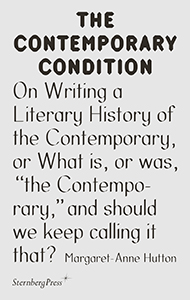A critical analysis of the use of the term contemporary in scholarly and disciplinary discourses through the hypothetical project of a
literary history of “the contemporary.”
“The contemporary” is an established term in a range of scholarly and disciplinary discourses, but what does it mean? Interweaving sections drawn from an (apparently) hypothetical and oxymoronic project—the writing of a literary history of “the contemporary”—with a critical analysis of the term(s) “the contemporary” and “contemporary” in the work of a range of theorists, Margaret-Anne Hutton sets out to expose the inconsistencies and ambiguities in its terminological usage, and to unpick some of the knots which bind the substantive and adjective. How can “(the) contemporary” function as a critical term, and how might we map its history?
This book is the volume 8 of “
The Contemporary Condition” series, edited by Geoff Cox and Jacob Lund and published with Aarhus University, and ARoS Art Museum (Denmark). The aim of the series is to question the formation of subjectivity and concept of temporality in the world now. It begins from the assumption that art, with its ability to investigate the present and make meaning from it, can lead to an understanding of wider developments within culture and society. Addressing a perceived gap in existing literature on the subject, the series focuses on three broad strands: the issue of
temporality, the role of contemporary
media and
computational technologies, and how artistic practice makes epistemic claims.
Margaret-Anne Hutton is Professor of French and Comparative Literature, and Director of the Institute for Contemporary and Comparative Literature at University of St Andrews, Scotland.

